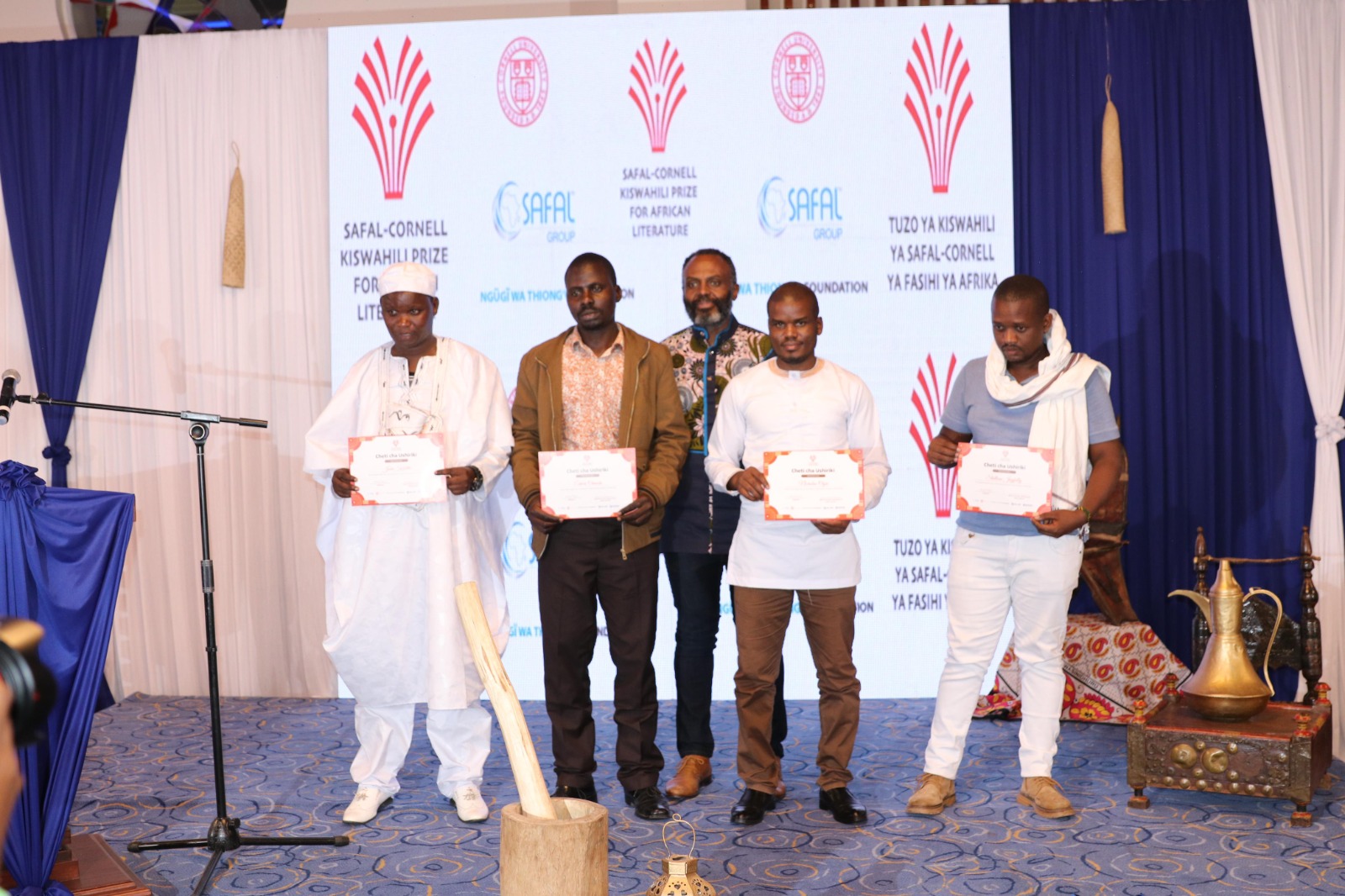Historic win for first female winner in Safal-Cornell Kiswahili Prize

The award brought together industry leaders and other stakeholders, both from Kenya and Tanzania, to witness the event, intending to promote reading and writing in Kiswahili.
Formerly known as the Mabati-Cornell Kiswahili Prize, the Safal-Cornell Kiswahili Prize held on Friday in Nairobi saw writers and poets go home with smiling faces.
The award brought together industry leaders and other stakeholders, both from Kenya and Tanzania, to witness the event, intending to promote reading and writing in Kiswahili.
More To Read
The $15,000 (Sh2,435,283) cash award is split among four different winners. First place in fiction, non-fiction, and poetry will receive $5000 (Sh811,761), respectively, while two runner-ups in any genre will receive $2,500 (Sh405,880) each.
“I am so happy to have been awarded as the winner of the Safal-Cornell Kiswahili Prize under the poetry category,” Fatuma Salim said as she softly smiled, noting that she had adequately prepared for the competition and had high hopes.
Fatuma is the first female to win the renowned honour, which had previously been dominated by her male colleagues.
Being a teacher in Zanzibar, Fatuma thanked the team for appreciating poets and bringing such competition.
“Being among the eight finalists was a blessing on its own, as there were over 150 other writers and poets who joined the competition,” she added.
This is her second time being in Kenya, and she was awarded $5,000 (Sh811,761).
Philipo Oyaro was crowned the winner in the fiction category.
As a writer, Oyaro stated that he was thrilled to have been awarded and encouraged other writers to not give up in their quest to become the best they could.
“I am so happy to have the winner of the award in the fiction category. It has been a journey of hard work and resilience, and I would like to urge other writers to not give up.”
He also encouraged the other finalists, saying everyone's a winner, as getting to the top eight is an achievement.
Oyaro also went home with $5,000 (Sh811,761).
 Safal-Cornell Kiswahili Prize held on Friday in Nairobi. (Amin Abdullahi)
Safal-Cornell Kiswahili Prize held on Friday in Nairobi. (Amin Abdullahi)
At position two were Ahmad Simba (poetry) and Leonard Mtesigwa (fiction); they each received $2,500 (Sh405,880).
The other four are: Nicholas Ogal (fiction), John Karithi (poetry), Edwin Omindo (short story), and Stallone Joyfully (short story)
According to the judges, the eight finalists were picked from 196 qualifying entries, and they noted that there are a large number of Kiswahili writers and poets with high standards.
“These eight individuals are all winners; all the submissions they made caught our eyes, and the poems will really attract debates; they did a good job,” Professor Kyallo Wamitila, who spoke on behalf of the judges, said.
 Safal-Cornell Kiswahili Prize held on Friday in Nairobi. (Amin Abdullahi)
Safal-Cornell Kiswahili Prize held on Friday in Nairobi. (Amin Abdullahi)
The Safal-Cornell Kiswahili Prize is supported by Safal Group, through its subsidiaries Mabati Rolling Mills of Kenya, ALAF Tanzania, the Africana Studies Center at Cornell University, and the Ngugi wa Thiong’o Foundation.
The Safal-Cornell Kiswahili Prize for African Literature was founded in 2014 by Dr Lizzy Attree and Dr Mukoma Wa Ngugi to recognize writing in African languages and encourage translation from, between, and into African languages.
The chair of the board of the Kiswahili Literature Prize is the prominent Kiswahili poet, broadcaster and academic, Abdilatif Abdalla.
The chair of this year’s judges panel, Prof Kyallo W. Wamitila (University of Nairobi) when giving the decision of the judges said that the submissions were many and varied, which attests to the plethora of talented creative writers in East Africa writing in Kiswahili.
“This is something to be grateful for and augurs well regarding the future of Kiswahili literature. The idea to come up with this award, actualise and to sustain it is a major boon to young, aspiring as well as accomplished authors since it gives them a very good platform to show what they can do,” added Prof Wamitila.
Other judges who joined Prof Wamitila in reading and nominating the manuscripts for the 2023 competition were Dr Zuhura Badru of the University of Dodoma and Mr Ali Mwalim Rashid of the State University of Zanzibar.
Top Stories Today














































